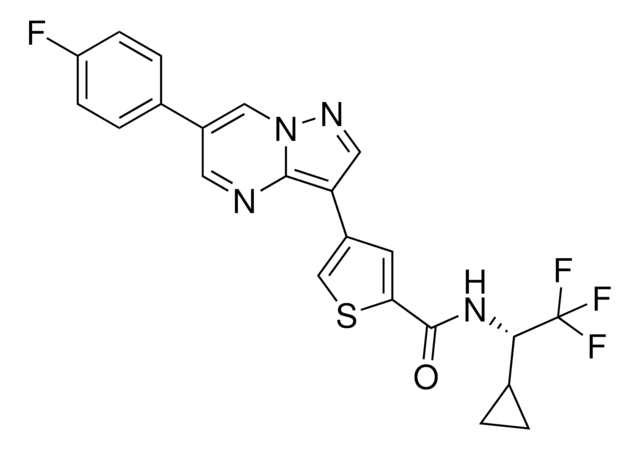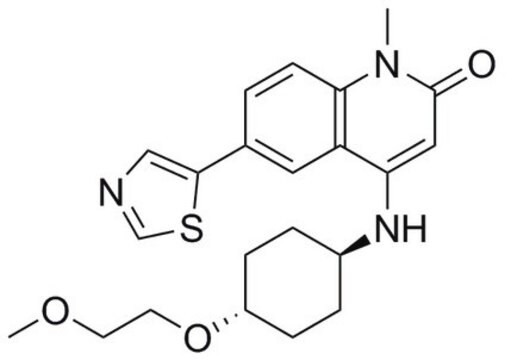567860
SRT1720
SRT1720, CAS 925434-55-5, is a cell-permeable inhibitor of the mitochondrial SIRT3. Inhibition is AceCS2-competitive (Ki = 0.56 µM; Km = 2.44 µM), but NAD+-uncompetitive (Ki = 0.34 µM; Km = 280 µM).
Sinónimos:
SRT1720, HAT Inhibitor XI, Histone Acetyltransferase Inhibitor XI, p300/CBP Inhibitor IX, N-(2-(3-(1-Piperazinylmethyl)imidazo[2,1-b]thiazol-6-yl)phenyl)-2-quinolinecarboxamide, Sirtuin-3 Inhibitor, SRT1720, SIRT3 Inhibitor II, HAT Inhibitor XI, Histone Acetyltransferase Inhibitor XI, p300/CBP Inhibitor IX, SIRT3 Inhibitor II, N-(2-(3-(1-Piperazinylmethyl)imidazo[2,1-b]thiazol-6-yl)phenyl)-2-quinolinecarboxamide, Sirtuin-3 Inhibitor, SRT1720
About This Item
Productos recomendados
Quality Level
assay
≥97% (HPLC)
form
solid
manufacturer/tradename
Calbiochem®
storage condition
OK to freeze
protect from light
color
yellow
solubility
DMSO: 2.5 mg/mL, clear, yellow
shipped in
ambient
storage temp.
−20°C
SMILES string
O=C(C1=NC(C=CC=C2)=C2N=C1)NC3=CC=CC=C3C4=CN5C(SC=C5CN6CCNCC6)=N4
InChI
1S/C25H23N7OS/c33-24(22-13-27-20-7-3-4-8-21(20)28-22)29-19-6-2-1-5-18(19)23-15-32-17(16-34-25(32)30-23)14-31-11-9-26-10-12-31/h1-8,13,15-16,26H,9-12,14H2,(H,29,33)
InChI key
IASPBORHOMBZMY-UHFFFAOYSA-N
General description
Packaging
Warning
Other Notes
Minor, R.K., et al. 2011. Sci. Rep.1, 70.
Huber, J.L., et al. 2010. Future Med. Chem.2, 1751
Pacholec, M., et al. 2010. J. Biol. Chem.285, 8340
Jin, L., et al. 2009. Protein Sci.18, 514
Feige, J.N., et al. 2008. Cell Metab.8, 347
Milne, J.C., et al. 2007. Nature450, 712.
Legal Information
Storage Class
11 - Combustible Solids
wgk_germany
WGK 3
flash_point_f
Not applicable
flash_point_c
Not applicable
Certificados de análisis (COA)
Busque Certificados de análisis (COA) introduciendo el número de lote del producto. Los números de lote se encuentran en la etiqueta del producto después de las palabras «Lot» o «Batch»
¿Ya tiene este producto?
Encuentre la documentación para los productos que ha comprado recientemente en la Biblioteca de documentos.
Los clientes también vieron
Nuestro equipo de científicos tiene experiencia en todas las áreas de investigación: Ciencias de la vida, Ciencia de los materiales, Síntesis química, Cromatografía, Analítica y muchas otras.
Póngase en contacto con el Servicio técnico













